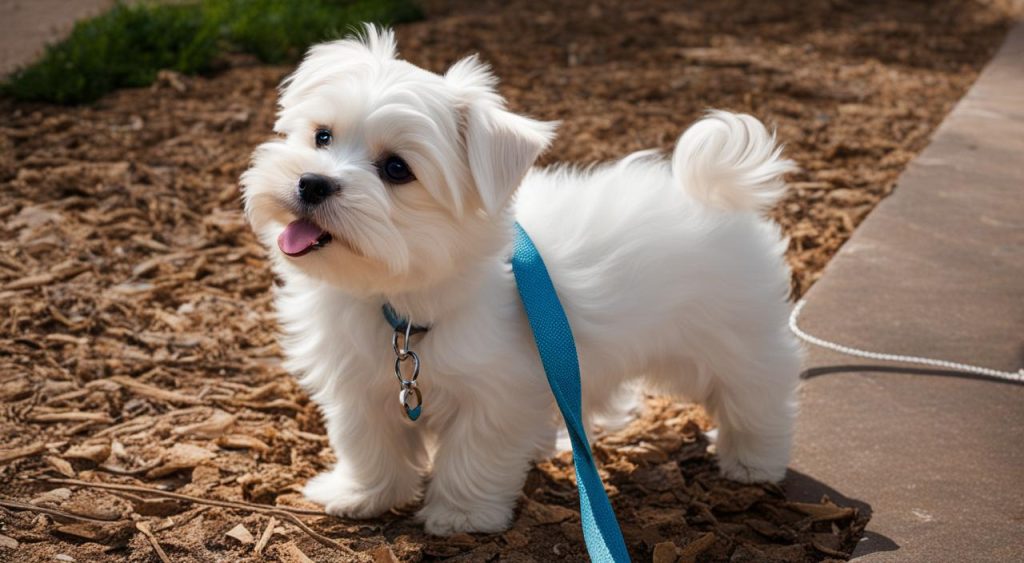The Maltese breed is known for its unique and captivating charm. These small, white dogs have been cherished pets for centuries, thanks to their bright, playful, and gentle temperament. If you’re considering adding a Maltese to your family, it’s important to understand the pros and cons of owning this delightful breed.
Key Takeaways:
- Maltese dogs are known for their bright, playful, and gentle temperament
- They are sensitive and responsive to training, excelling in obedience and agility
- Housebreaking can be challenging for most Maltese
- Separation anxiety is common, as they require a lot of companionship
- Maltese are well-suited for apartment living due to their miniature physique and moderate exercise needs
Before bringing a Maltese into your home, it’s important to consider the benefits and drawbacks of owning this breed. This article will explore the positive and negative aspects of having a Maltese, including their temperament, exercise needs, trainability, health, and more. By understanding both the advantages and potential challenges, you can make an informed decision about whether a Maltese is the right companion for you.
Size and Exercise Needs of a Maltese
Maltese are one of the smallest dog breeds, typically standing about 7-8 inches at the shoulder and weighing 4-7 lbs. However, some individuals may be smaller or larger than the average range. They are well-suited for apartment living due to their miniature physique and moderate exercise needs.
While they don’t require much outdoor exercise, they are lively and enjoy running around the house. Mental exercise, such as participating in dog sports or playing interactive games, is also important for their stimulation and overall well-being.
Indoor Activities for Maltese
When it comes to exercising a Maltese indoors, there are plenty of activities to keep them engaged. Consider incorporating puzzle toys or treat-dispensing toys that require them to problem-solve and work for their reward. Another fun idea is to set up an obstacle course using furniture or household items, challenging them to navigate through tunnels or jump over small obstacles.
You can also play hide and seek with their favorite toys or treats, providing mental stimulation and rewarding their sniffing abilities. Engaging in interactive play sessions with a variety of toys, such as tug-of-war or fetch, can help keep them physically active while strengthening the bond between you and your furry friend.
Remember, it’s important to supervise your Maltese during playtime to ensure their safety and prevent any accidents or injuries. By providing them with both physical and mental exercise, you can help keep your Maltese happy, healthy, and entertained.
Trainability of a Maltese
When it comes to trainability, the Maltese breed is highly intelligent and eager to please, which makes them easy to train. They have a knack for learning tricks, playing games, and excelling in dog sports such as agility and obedience. Their natural intelligence and quick learning ability make them a joy to train.
However, housebreaking a Maltese can be a challenge. They are notoriously difficult to housebreak, and it requires patience and consistency to achieve success. Positive reinforcement training methods work best with Maltese, as they respond well to praise, treats, and rewards. Consistency in training sessions and establishing a routine is essential for their understanding and progress.
One common obedience issue that Maltese owners face is excessive barking. Maltese dogs can be prone to barking, and it is important to teach them to be quiet and stop barking on command. Using positive reinforcement techniques, such as rewarding them for being quiet, can help curb their barking habits and promote a peaceful environment.
Another aspect of training a Maltese is addressing their strong attachment to their owners. While this is a lovely trait that showcases their loyalty and affection, it can also lead to separation anxiety. To prevent separation anxiety, gradual desensitization to being alone is recommended. Start by leaving them alone for short periods and gradually increase the duration as they become more comfortable.
Overall, the trainability of a Maltese is high, but like any dog, they require consistent training, positive reinforcement, and an understanding of their unique traits. With patience, effort, and a loving approach, you can successfully train your Maltese and enjoy a well-mannered and obedient companion.
Health and Longevity of a Maltese
Maltese dogs generally have a long life expectancy of 12-15 years, which is typical for small breeds. Despite their small size, they are generally healthy dogs. However, like any breed, Maltese can be prone to certain health issues.
Maintaining the health of your Maltese requires special attention to their small size and fragile bones. Caution should be taken during playtime, especially when interacting with larger dogs, to prevent injuries.
Regular grooming is essential for Maltese to maintain their beautiful coat and prevent tangling or matting. Their long, silky hair requires regular brushing to keep it clean and free of tangles.
While Maltese may not be the most imposing guard dogs due to their size, they are alert and have a bold streak, making them good watchdogs. Their keen senses and tendency to bark when they sense something unusual can help alert you to potential threats.
Overall, the health and well-being of your Maltese can be maintained through regular vet check-ups, a balanced diet, exercise, and grooming routine. By providing proper care, you can ensure your Maltese companion lives a long and healthy life.
Conclusion
Owning a Maltese can be a truly rewarding experience, but it’s important to consider both the pros and cons before bringing one into your home. The advantages of owning a Maltese include their unwavering love and affection, their ability to adapt to any lifestyle, and their hypoallergenic and low-shedding coat, which makes them ideal for individuals with allergies. Their small size and easy-to-handle nature also make them great companions for people of all ages, including children. Additionally, their high level of trainability allows them to excel in learning tricks and participating in dog sports.
However, it’s essential to be aware of the challenges that come with owning a Maltese. Grooming is a significant aspect of their care, as their beautiful coat requires regular maintenance to prevent tangles and matting. Their small size also puts them at risk of injury, so extra caution must be taken during playtime, especially with larger dogs. Additionally, due to their affectionate nature, spoiling a Maltese can lead to behavioral issues and separation anxiety.
Despite these challenges, the joy and companionship a Maltese can bring to your life are unparalleled. It’s crucial to consider your readiness to meet their needs before making the commitment to own one. With proper care, training, and attention, a Maltese can be a wonderful addition to your family, providing you with years of love, happiness, and unforgettable memories.





